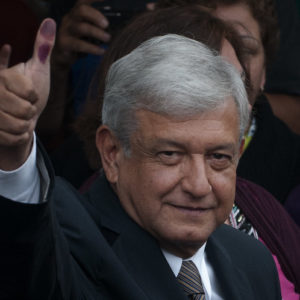This week marks the visit of Mexican President Andrés Manuel López Obrador to the United States to meet with President Trump. He arrives at a time of tremendous uncertainty in both the U.S. and Mexico.
The health of the American people and the economy are in flux.
Mexico too is reeling, with an economy that began shrinking before the pandemic, and credit rating agencies have recently downgraded its sovereign debt to near junk bond status. For both leaders, the meeting offers an opportunity for leadership and establishing much needed certainty as a path forward.
The talks will focus on trade and investment, areas in which both countries have opportunities to help each other. A prime example lies within the telecommunications industry.
A healthy, growing telecommunication industry in Mexico will provide much needed economic stimulus to its economy. Mexican consumers stand to benefit from lower prices, innovation, investment and the prospect of keeping pace with the surge of mobile broadband that is occurring around the world.
A healthy Mexican communications sector is in the interest of the United States as well. An open, competitive and well-governed Mexican telecommunications sector provides not only investment opportunities for U.S. companies but also would weave more tightly the fabric of the irrevocably bound U.S. and Mexican economies.
Most central to these benefits, the United States-Mexico-Canada Agreement (USMCA) includes provisions binding Mexico to a variety of pro-competitive safeguards in the telecommunications sector enacted through constitutional reforms it adopted in 2013.
These commitments to open, competitive telecommunication markets that are governed by independent regulators offer both policy certainty and the promise of economic benefits to both countries. Indeed, recent economic research has documented that the promises of the 2013 reforms, including lower prices and higher mobile phone penetration rates, are now becoming realities.
Against this backdrop, it is unsettling that proposals within Mexico have emerged recently that appear to retreat from the path established in the 2013 reforms.
Especially troubling is a proposal that would abolish the Mexican telecommunications regulatory agency, the Federal Telecommunications Institute, which was established in the 2013 reforms. Under the proposal, telecommunications regulatory functions would be subsumed into a multi-sectoral regulatory body whose jurisdiction would include energy and competition.
Were this proposal to move forward, it risks economic harm in at least three ways. First, the envisioned appointment process for regulators to the new multi-sectoral regulator would be freed from the current requirement that regulators demonstrate technical competency.
This would create the corresponding risk of the appointment of career politicians rather than fully independent and qualified regulators to the new agency. This risk is especially acute in Mexico, with its pre-2013 reforms history of ineffectual regulation that suffered from regulatory capture.
Second, the proposal risks unwinding the economic benefits — such as lower prices and increased investment — that are now beginning to be realized under the 2013 reforms. It is ironic that the proposal for a new regulatory agency is emerging at the moment when Mexico’s telecommunications regulator is for the first time acting as an independent body on par with its international counterparts.
Third, the policy uncertainties generated by the establishment of a new and untested regulatory agency in Mexico will create a decidedly unpalatable environment for firms operating in and potentially investing in the Mexican telecommunications sector.
The U.S.-Mexico talks this week provide an especially important opportunity for President López Obrador to provide the United States with assurances that Mexico remains fully committed to the path of reforms to its telecommunications sector that it adopted in 2013.
Taking this opportunity would provide much needed certainty in our otherwise uncertain times.

